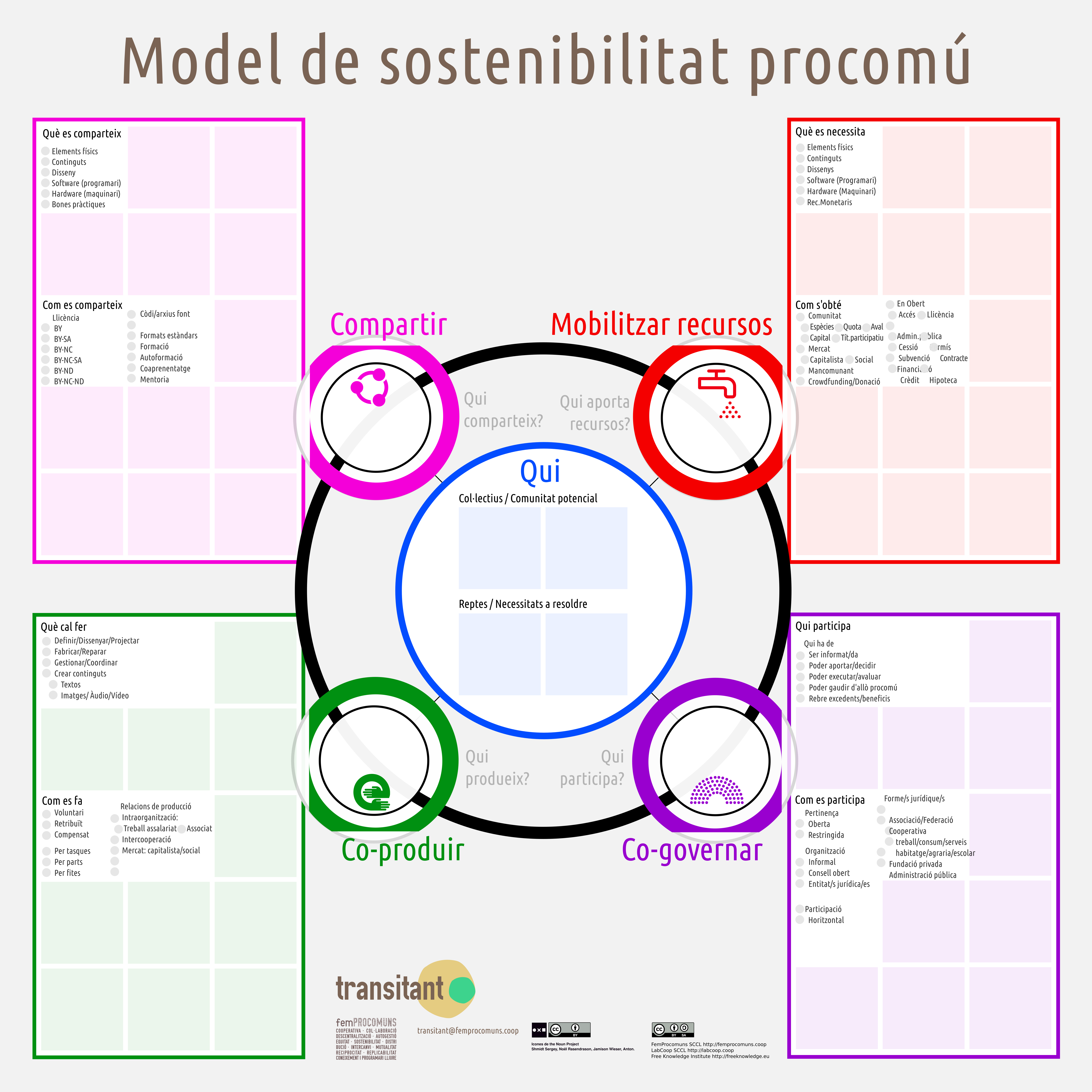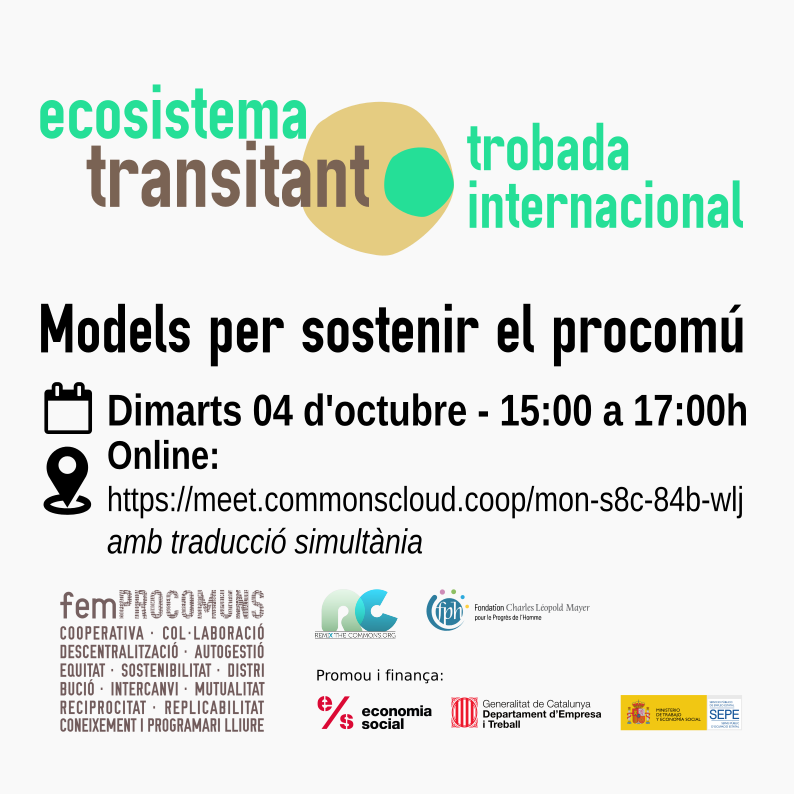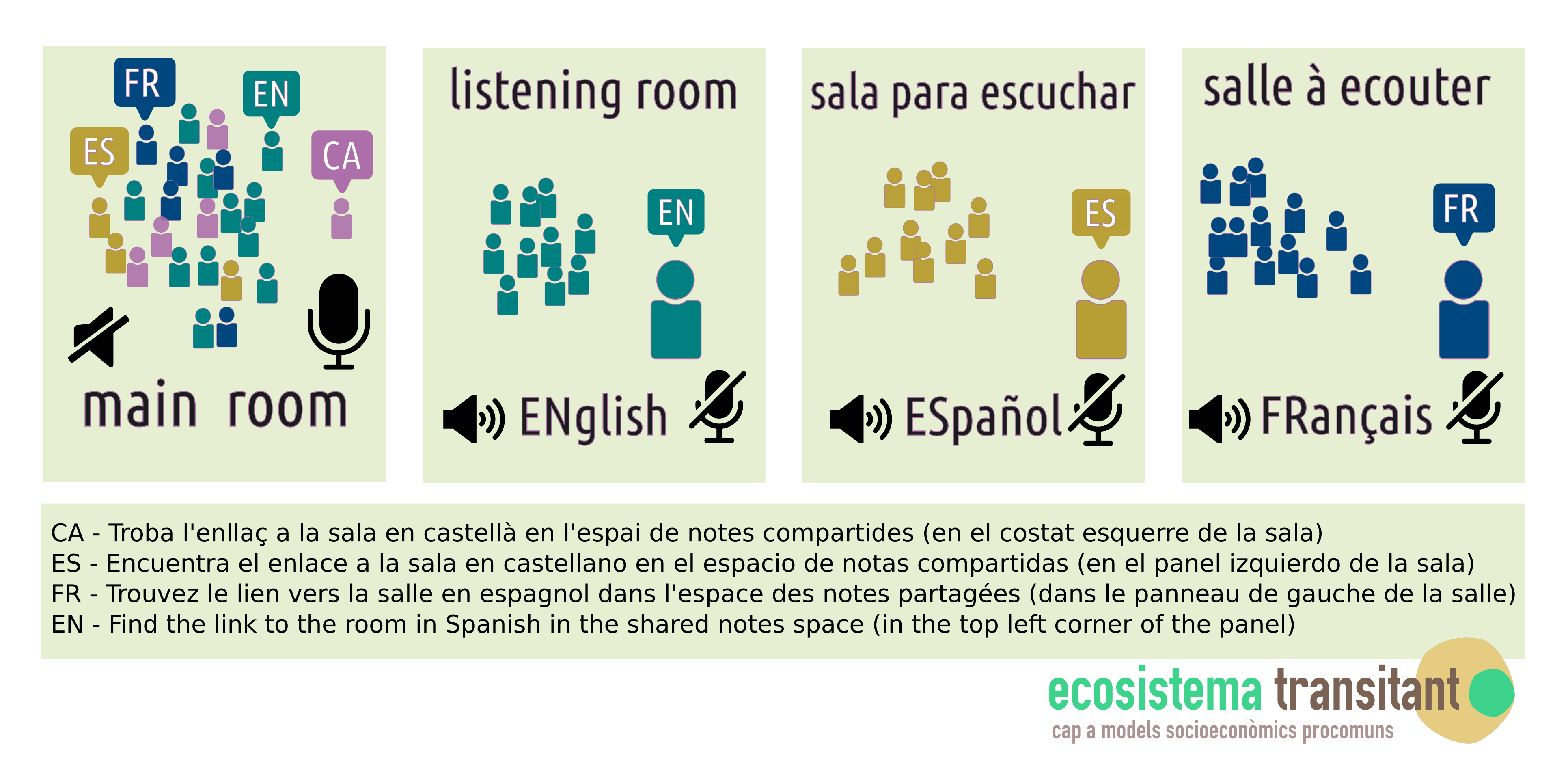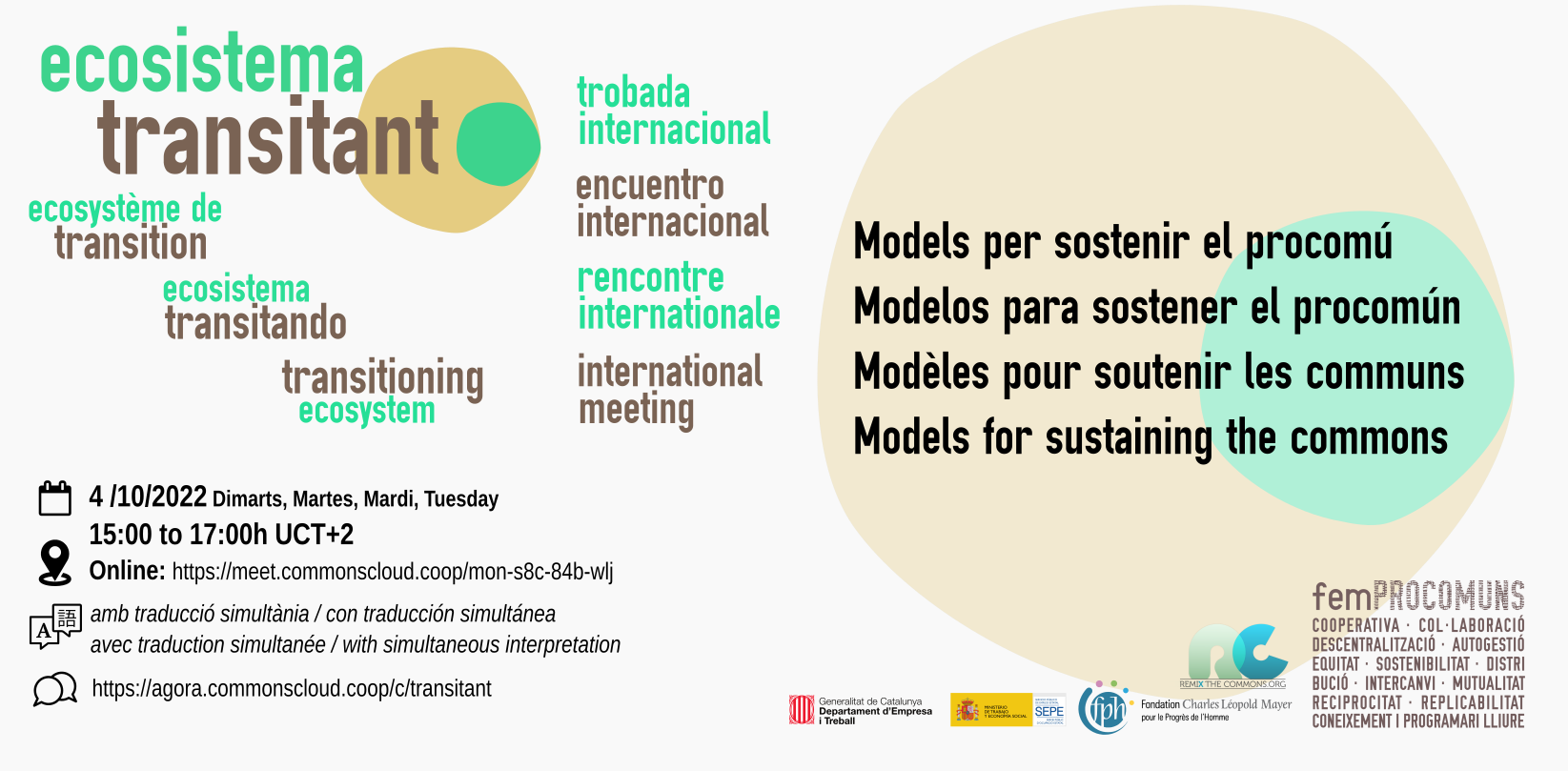This post is also available in: Español (Spanish) English
El pròxim dimarts, 4 d’octubre a la tarda, ens trobarem online per compartir metodologies i eines per als procomuns, en una sessió que dona continuïtat a la feina feta des de l’Ecosistema Transitant.

Ecosistema Transitant són una sèrie de sessions impulsades des del Grup d’Activitat Cooperativitzada (GAC) Transitant de femProcomuns, per treballar col·lectivament reptes relatius a àmbits clau de l’economia: l’energia, el territori, l’aigua, l’alimentació, les cures, l’habitatge, el voluntariat, les metodologies …, des del punt de vista de la producció, el proveïment i els impactes ambientals, amb una mirada procomú (guiada pel Model de sostenibilitat però amb voluntat d’aprendre i incorporar aspectes d’altres models i artefactes) i amb la participació d’actors diversos, de Catalunya i d’arreu.
En el model socioeconòmic procomú les persones s’auto-organitzen per resoldre necessitats i reptes des d’una lògica comunitària i de sostenibilitat. El procomú és un model d’organització social i econòmica al costat del mercat i de l’estat. Sumant-se als nombrosos casos de producció, reproducció i gestió del procomú tradicional que s’han sostingut al llarg dels anys, en les darreres dècades s’han posat en marxa projectes tecnològics, urbans i culturals, alguns dels quals utilitzen llicències lliures i obertes, amb models de producció, reproducció, gestió i presa de decisions distribuïts i democràtics. Són projectes diferents entre si, però que comparteixen uns principis i qualitats.

És en aquest context que des de femProcomuns (cooperativa integral d’usuaris/as i treballadors/es) impulsem aquesta trobada, per fer evolucionar i obrir la xarxa d’intercooperació creada i els aprenentatges fets, en els últims 5 anys, entorn diferents espais a Catalunya i a altres indrets.
Impulsem la trobada en el marc del Grup de Treball Ecosistema Procomú: femProcomuns (Catalunya), Remix the Commons (Francofonia), B.A.Balex (França), Projet Collectif (Quebec) i Solidarius Italia ( Itàlia).
La sessió tindrà lloc en línia, el 4 d’octubre, de 15:00h a 17:00h.
([traducció simultània] Català, Castellà, Anglès i Francès)
Inscripcions obertes
Pad de treball de la sessió: https://pad.femprocomuns.cat/p/Transitant_international_041022
Amb la participació de:
- Presentació de la sessió. femProcomuns. David Gómez, Raquel Prado, Mònica Garriga, David Jacovkis
—————– - El Model de sostenibilitat del Procomú. femProcomuns. David Gómez
- Construint una economia comunitària col·laborativa: El cas de La Comunificadora. Dimmons/La Coop des Communs. Vera Vidal
- De l’alimentació a la governança, produir coneixement situat amb l’Escola dels Comuns. Remix the commons, AFAP, B.A.Balex
- Cultivar el procomú, d’Europa al Quebec. Projet Collectif. Marie Soleil L’Allier
- Cas d’ús del Model de sostenibilitat del Procomu a Foresta, Marsella. Alima El Bajnouni
——————- - ColMeth: Kit Co-disseny de recerca col·laborativa. Peer-Produced Research Lab. Enric Senabre
- Fermentant metodologies per a nodrir processos. ColaBoraBora. Ricardo Antón
- R-Urban: una estratègia de resiliència a través dels comuns.atelier d’architecture autogérée (aaa). Constantin Petcou
- Calculant el valor del procomú. atelier d’architecture autogérée (aaa). Doïna M Petrescu
—————— - Transition Action. France Nature Environnement. Lou-ann Hennequin
- Projecte Betula: Promoció integral dels pobles del Cadí Moixeró a través del paisatge. L’Arada Creativitat Social. Marina Vilaseca i Ferran Canudas
- Escola Rural D’Economia. El dibuix és la nova comptabilitat. Community Economies Institute. Kathrin Böhm
Al llarg d’aquests anys hem vist que la dimensió relacional de les comunitats on se situen els projectes, és el principal element que fa que els projectes siguin procomuns. A més d’elegir i conèixer les eines necessàries (tecnològiques, jurídiques, de gestió,…), és bàsic que les persones que pertanyen a la comunitat comparteixin interessos, s’identifiquin amb el projecte, s’auto-organitzin i auto-gestionin, sàpiguen com mobilitzar els recursos que necessiten per a sostenir-se, com organitzar el mode de producció, on trobar el coneixement que necessiten i tinguin una política sobre com compartir el coneixement que generen. Si es tracta d’una comunitat ja existent amb vincles socials previs i auto-organitzada, serà més fàcil. Si es tracta d’un grup motor, que vol activar una comunitat o articular una comunitat nova, serà necessari planificar amb cura el projecte.
Hem assajat el Model de sostenibilitat del procomú, hem elaborat textos explicatius que en detallen el marc teòric i conceptual i hem desenvolupat un kit de recursos amb llenços visuals i jocs per explorar i treballar els projectes des d’una mirada més procomuna, ecològica i feminista.
Volem compartir aquesta experiència acumulada amb agents que tenen aquesta mirada, procomuna, ecològica, democràtica, feminista… i que estan sensibilitzats per l’activació de les economies locals, per l’acció comunitària i per la innovació ciutadana; d’actors (iniciatives de base, empreses socials, cooperatives, laboratoris ciutadans,…) actius a Catalunya, Europa i més enllà, amb qui poder compartir infraestructures, coneixements, metodologies i eines.
També volem conèixer experiències i metodologies que s’estan duent a terme per altres agents i en altres indrets, compartir pràctiques, visions i idees amb projectes d’altres llocs de Catalunya, de França o el Quebec. Us convidem a participar en la sessió online i a donar a conèixer la manera com vosaltres esteu duent a terme la vostra pràctica. La sessió, de només dues hores, no donarà perquè tothom presenti oralment, però recollirem totes les iniciatives per escrit en un pad, i donarem continuïtat a la conversa a través d’un espai a l’Àgora que hem habilitat per parlar de la transició cap al procomú.
Utilitzarem Meet.coop (en SomNuvol.coop) per a la interpretació simultània online
Utilitzarem l’eina de videoconferència de programari lliure Meet.Coop a CommonsCloud la qual encara no té la funcionalitat per a la interpretació simultània en línia, així que adaptarem a eina a les nostres necessitats:
Farem servir diferents sales de meet.commonscloud per a la traducció simultània. Tots els participants estaran sempre connectats a la Sala principal, on podran escoltar el que es diu en l’idioma escollit per cadascuna de les persones que parlin i on podran parlar. I cada participant obrirà una segona finestra, on escoltarà la traducció simultània en l’idioma que esculli, però on no es podrà interactuar (castellà, anglès, francès).
Sala principal: https://meet.commonscloud.coop/mon- s8c-84b-wlj
Sala en anglès: https://meet.commonscloud.coop/mon -dik-xyb-qvp
Sala en espanyol: https://meet.commonscloud.coop/mon -map-xur-kin
Sala en francès: https://meet.commonscloud.coop/mon -he1-v6e-ji3
Amb la interpretació simultània feta per:
![]()

Us recomanem tenir dues pestanyes o finestres obertes: de la Sala principal i de l’idioma de la traducció simultània. Podeu deixar oculta la pestanya de la sala de l’idioma triat i deixant activa la pestanya de la sala principal (on recordeu podeu interactuar, però l’idioma pot canviar segons l’interlocutor). Per tal que només sentiu l’àudio de la sala traduïda podreu silenciar l’àudio de la pestanya de la Sala principal fent clic al símbol d’àudio a la seva pestanya del navegador o clicant amb el botó dret sobre la pestanya i triant l’opció “Silencia la pestanya”.
Quan vulguis parlar en català, hauràs de parlar només a la sala principal (a les altres sales hi haurà la traducció simultània)
Canviar el so de la sala serà qüestió de fer clic al símbol d’àudio en una pestanya del navegador Firefox (clicant amb el botó dret sobre la pestanya), si feu servir Chrom o Chromium us caldrà obrir les dues sales en finestres privades o incognito. Canviar de sala visionada serà qüestió de seleccionar la pestanya o finestra al navegador. Un participant amb la càmera encesa podrà ser “vist” a les dues sales, i també serà “vist” a la llista de participants en les dues sales i al xat públic d’ambdues sales.
Trobeu més informació sobre com silenciar pestanyes en aquesta cerca i en aquest article en castellà.
Ecosistema Transitant, és finançat per línia L2 Projectes singulars de promoció de l’economia social i solidària, creació de cooperatives i projectes d’intercooperació, de la Generalitat de Catalunya, Departament d’Empresa i Treball. Direcció General d’Economia Social i Solidària, el Tercer Sector i les Cooperatives.

